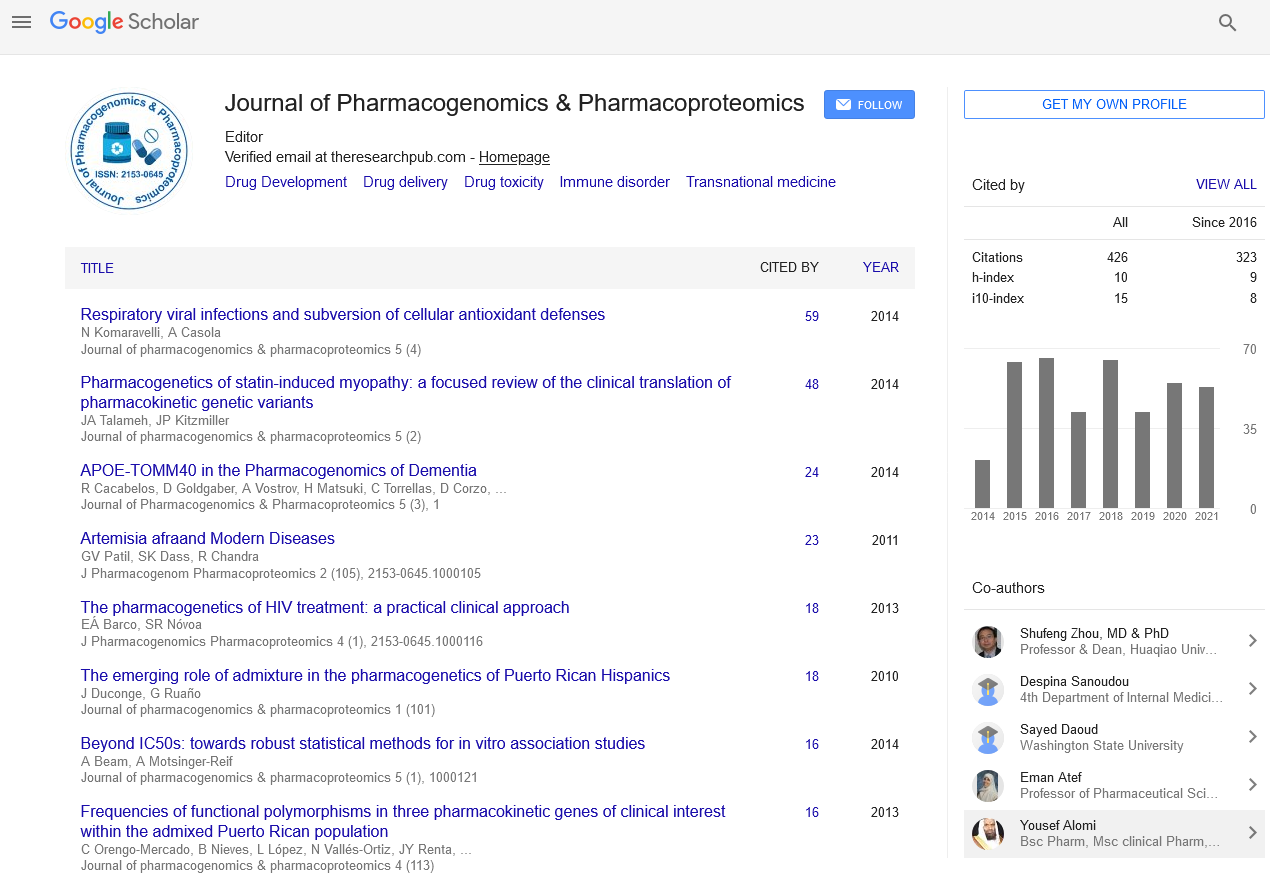Indexed In
- Open J Gate
- Genamics JournalSeek
- Academic Keys
- JournalTOCs
- ResearchBible
- Electronic Journals Library
- RefSeek
- Hamdard University
- EBSCO A-Z
- OCLC- WorldCat
- Proquest Summons
- SWB online catalog
- Virtual Library of Biology (vifabio)
- Publons
- MIAR
- Euro Pub
- Google Scholar
Useful Links
Share This Page
Journal Flyer

Open Access Journals
- Agri and Aquaculture
- Biochemistry
- Bioinformatics & Systems Biology
- Business & Management
- Chemistry
- Clinical Sciences
- Engineering
- Food & Nutrition
- General Science
- Genetics & Molecular Biology
- Immunology & Microbiology
- Medical Sciences
- Neuroscience & Psychology
- Nursing & Health Care
- Pharmaceutical Sciences
Liquid biopsy based diagnostics as an alternative to tissue biopsies prior to ImmTAC therapy for cancer
8th European Conference on Predictive, Preventive and Personalized Medicine & Molecular Diagnostics
August 20-21, 2018 | Rome, Italy
Mark J Powell
Immunocore Ltd, UK
Keynote: J Pharmacogenomics Pharmacoproteom
Abstract:
Immune mobilizing monoclonal T-cell receptor (TCRs) against cancer (ImmTAC???) molecules are a novel class of immunotherapy agent comprised of an affinity enhanced soluble TCR fused to a T-cell redirecting scFv anti-CD3 to activate a highly potent and specific T cell response to recognize and destroy cancer cells. The TCR portion of the ImmTAC molecule specifically interacts with intra cellular processed peptides presented on the cell surface by a specific subtype of human leukocyte antigen (HLA). For example, the most advanced ImmTAC molecule, IMCgp100, which is currently in pivotal trials for the treatment of metastatic uveal melanoma, interacts with a gp100 peptide presented by HLA-A*0201. As a result, a key inclusion criterion for patient selection onto ImmTAC clinical trials is HLA typing via a blood sample. A further pre requisite to ImmTAC therapy is to determine expression of the target antigen within a patient???s tumor and the current method is to perform immuno histochemical staining (IHC) or qPCR on a tumor biopsy. However, obtaining fresh tissue biopsies is invasive, carries risk and may not be medically feasible and if utilized, archival biopsies may not reflect the state of the tumor at the time of treatment. Hence, we are seeking to establish a complementary patient selection process based on liquid biopsies using a simple blood draw. Based on the analysis of circulating tumor cells (CTCs), circulating tumor DNA (ctDNA), or tumor-derived extracellular vesicles (exosomes) shed from tumors into the circulation, liquid biopsies provide a source of tumor biomarkers from blood. Additionally, a liquid biopsy potentially allows sampling of all tumors carried by a patient while a single tissue biopsy may not capture inter or intra tumor heterogeneity. We ultimately aim to screen potential patients using a liquid biopsy assay for expression of an ImmTAC target antigen prior to enrollment on a clinical trial. Treatment responses can also be monitored more regularly using liquid biopsy based on blood sampling. Here, we outline the steps taken and the model systems applied to establish these techniques. The specific challenges associated with implementing liquid biopsy assays into a clinical trial will be discussed.
Biography :
Dr. Mark Powell is from the UK and received a 1st Class BSc. Honours degree in Biochemistry from the University of Bath (1994) which included an internship in the Group of Professor Robert G. Webster FFS, St.Jude Children’s Research Hospital, Memphis Tennessee. Afterwards he studied Immunology in Professor Herman Waldmann’s lab at the Sir William Dunn School of Pathology, University of Oxford, and received a PhD (D.Phil) (1998). Mark was a Novartis post-doctoral scientist, 1998-2001 based predominantly at stemix Inc, Palo Alto. USA. Mark worked for Rigel Pharmaceuticals 2001-2007 and UCB Pharma 2007-2015 in the fields of Immunology and cancer before joining Immunocore in 2015.
E-mail: mark.powell@immunocore.com


